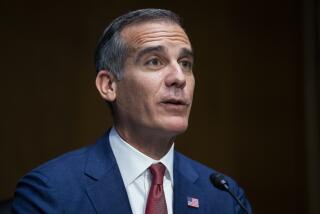Eric Garcetti for mayor
Studying the top five mayoral contenders before the March primary, The Times selected Eric Garcetti as the candidate most likely to rise to the occasion and lead Los Angeles into a successful future.
Now the runoff between Garcetti and Wendy Greuel is well into the home stretch, and the candidates have been able to focus a bit more on their plans and programs, and on their critiques of each other. Garcetti remains our choice.
That’s based in large part on the records both candidates have compiled in city government over more than a decade, and less on the statements, charges, claims, counterclaims, missteps, outrageous mailers, misleading ads, high-profile endorsements and spending reports that have emerged in the course of the campaign. In theory, political campaigns can boil down candidates to their essences and put voters in a better position to distinguish among them and to make their choices, but it rarely turns out that way. In this race, as in so many others, the campaigns have produced more heat than light, more diversion than focus.
ENDORSEMENTS: Los Angeles City Elections 2013
Does the independent expenditure campaign underwritten by the union representing Department of Water and Power workers really mean that Greuel is “bought and paid for,” as Garcetti charges? Does Garcetti’s $1.25 per year in royalties from a petroleum lease at Beverly Hills High School really make him an oil tycoon who profits at the expense of children’s health? Did Greuel really propose an irresponsible police hiring binge that the city simply can’t afford? Was Garcetti, as council president, any more responsible than was Greuel, as city controller, for the rising unemployment rate in Los Angeles during the mortgage crisis and recession? Is Greuel a political climber who covered up her Republican past to be viable in an overwhelmingly Democratic town, and Garcetti a trust fund baby who has latched on to liberal causes for their cachet?
Oh, please. Enough already.
Cast aside the campaigns and look closely at their records, and both candidates emerge as earnest, ambitious and talented politicians, each of whom has made some good moves and some bad ones over the course of their careers, each of whom could have done a better job crafting city policy and safeguarding city resources.
WATCH: Garcetti video interview | Greuel video interview
But Greuel disappointed as city controller. It’s not that she didn’t do her job; she did, performing audits, unmasking some problems on her own, responding to others as they emerged, offering appropriately conservative estimates of revenue and careful critiques of spending. As a city employee, she earned a grade of “meets expectations.”
But she didn’t earn a promotion. Controller is a poorly named and loosely defined job in city government that nevertheless allows the woman or man holding the office to propose far-reaching revamps of policies and processes. In a government without political parties, the controller could and should be the loyal opposition, the gadfly in chief, the public advocate. Greuel always seemed to grasp the political value of purporting to find waste, fraud and abuse in City Hall but never was able to outline for Angelenos the larger narrative of what was going wrong or how things could be better. She found a contract that she believed should be renegotiated or a program that should be better supervised, but she didn’t tell the city, in essence, “Here is why building inspectors are being indicted, this is the reason the Housing Authority gets away with wasting money, here is how the mayor is mismanaging city departments and how the council members are failing in their oversight duties, and here’s what can be done about it.”
Garcetti, as council president, had a different role, but he did a better job with it. He was late to deal with the budget crisis, but he got there and, importantly, he then got his reluctant colleagues there as well, overseeing difficult budget cuts and taking the first tentative steps toward resolving the city’s pension problem. At the same time, he remade his district with innovative programs to deter gang crime, erase graffiti, house the homeless and provide shelter for the addicted and those in need of mental health services. He guided Hollywood to a renaissance and helped make it, once again, a geographic destination rather than merely the description of an industry headquartered across the city limits in Burbank.
PHOTOS: A rogues’ gallery of L.A. mayors
Perhaps most important, Garcetti has demonstrated the capacity to grow, learn and improve his performance. He admits mistakes, such as his vote in favor of a settlement allowing, for a time, virtually unregulated digital billboards. Neither candidate has the executive experience one would like to see in a mayoral candidate. Greuel’s response, tellingly, is to cite her role helping to manage a small family construction business and to assert, and perhaps to believe, that it is sufficient.
Selecting a mayor may sometimes seem just as random as (and a lot less fun than) picking a winner on “American Idol,” but in the end it’s a hiring decision. Of the applicants, who is best suited to the job? Neither candidate is ready, but Greuel seems like a completed project that falls short of what’s needed, while Garcetti comes off as a creative work in progress with potential to meet the challenge. That makes the choice easy. It’s Garcetti.
More to Read
A cure for the common opinion
Get thought-provoking perspectives with our weekly newsletter.
You may occasionally receive promotional content from the Los Angeles Times.










